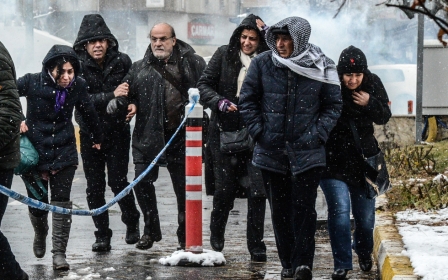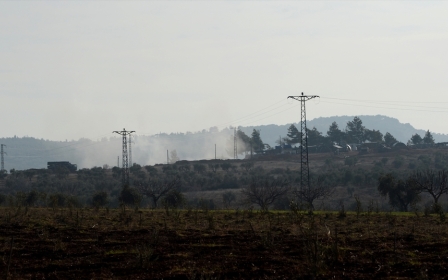At least 28 killed as blast rocks military convoy in Ankara

At least 28 people were killed and 61 wounded in a car bomb targeting the Turkish military in the capital Ankara on Wednesday, the city's governor said.
World leaders have condemned the attack, pledging to support the Turkish government in efforts to bring the perpetrators to justice and boost security.
Hours after Wednesday night's attack, the Turkish army retaliated by bombing sites controlled by the PKK in northern Iraq, killing around 70 of the group's members including several leaders.
The PYD denied responsibility for the attack, with its leader Saleh Muslim telling Sky News Arabia that his group has "no connection" to Wednesday night's bombing.
Wednesday night's bombing was aimed at a convoy of military service vehicles, Ankara governor Mehmet Kiliclar said, quoted by the CNN-Turk and NTV channels.
Plumes of smoke were seen rising over an area and the powerful blast was heard all over the city, sending residents to their balconies in panic, an AFP correspondent said.
Ambulances and fire engines were sent to the scene, which is near the Turkish military headquarters and the parliament.
"I was at a main boulevard some 500 metres (1,640 feet) from the scene," 25-year-old Gurkan told AFP.
"People started to run in all directions in panic as soon as we heard a strong explosion. I saw a huge fireball growing."
Among the first to arrive were opposition MPs, who had rushed over from the nearby parliament building.
"I was at the General Assembly at the time of the attack. I heard the sound and walked into the compound of the naval forces command," said Engin Altay of the opposition Republican People's Party (CHP).
"Everyone including security forces was in panic. Firefighters were hardly able to proceed into the area. There was a big blaze. I saw buses on fire. I was only 50 metres away.
"It's a sad sight, and a fresh blow to people's morale," he told AFP.
NTV television said the explosion happened near a residential block for top-level military staff, thought to include Turkish Air and Land Force commands.
The spokesman for the ruling Justice and Development Party (AKP), Omer Celik, said he strongly condemned the attack, Turkish media reported.
Prime Minister Ahmet Davutoglu has cancelled a scheduled visit to Brussels, according to AFP.
Pledge to 'respond in kind'
President Recep Tayyip Erdogan on Wednesday vowed that Turkey was more determined than ever to use its right to "self-defence" after the car bomb targeting military service vehicles killed at least 28 people.
"Our determination to respond in kind to attacks taking place inside and outside our borders is getting stronger with such acts," Erdogan said in a statement. "It must be known that Turkey will not shy away from using its right to self-defence at any time, any place or any occasion."
Deputy Prime Minister Numan Kurtulmus acknowledged: "We don't have any information yet about who carried out this attack" but vowed the perpetrators "will be revealed as soon as possible."
The Islamic State group has been blamed for a slew of bombings in the country since the middle of last year but the outlawed Kurdistan Workers' Party (PKK) has also killed dozens of soldiers in attacks that have mainly targeted the southeast of the country.
The capital Ankara had already been on high alert after 103 people were killed on 10 October, when two suicide bombers blew themselves up in a crowd of peace activists in Ankara, the bloodiest attack in the country's modern history.
Eleven people, all German tourists, were also killed on 16 January when a suicide bomber blew himself up in the tourist heart of Istanbul.
Those attacks were blamed on the Islamic State group, as were two other deadly bombings in the country's Kurdish-dominated southeast earlier in the year.
Turkish authorities have in recent weeks arrested several suspected IS members, with officials saying they were planning attacks in Istanbul and Ankara.
But Turkey is also waging an assault on the PKK, which has staged dozens of deadly attacks against members of the security forces in the southeast.
Ankara has also been carrying out air strikes against Syrian Kurdish fighters across the border in war-torn Syria since the weekend.
A Kurdish splinter group, the Freedom Falcons of Kurdistan (TAK), claimed a mortar attack on Istanbul's second international airport on 23 December, which killed a female cleaner and damaged several planes.
The United States on Wednesday forcefully condemned the deadly car bomb targeting the Turkish military, reaffirming US solidarity with its NATO partner and key regional ally.
"The United States strongly condemns the terrorist attack on Turkish military personnel and civilians today in Ankara, Turkey," deputy State Department spokesman Mark Toner said in a statement.
"We reaffirm our strong partnership with our NATO ally Turkey in combatting the shared threat of terrorism attacks."
Leaders of Germany, France, Italy and the UK expressed their solidarity with Turkey in the aftermath of the bombing, with Qatar promising to "support all measures [Turkey] takes to face such criminal acts".
The PKK launched an insurgency against the Turkish state in 1984, initially fighting for Kurdish independence although now more for greater autonomy and rights for the country's largest ethnic minority.
The conflict, which has left tens of thousands of people dead, looked like it could be nearing a resolution until an uneasy truce was shattered in July.
Stay informed with MEE's newsletters
Sign up to get the latest alerts, insights and analysis, starting with Turkey Unpacked
Middle East Eye delivers independent and unrivalled coverage and analysis of the Middle East, North Africa and beyond. To learn more about republishing this content and the associated fees, please fill out this form. More about MEE can be found here.




